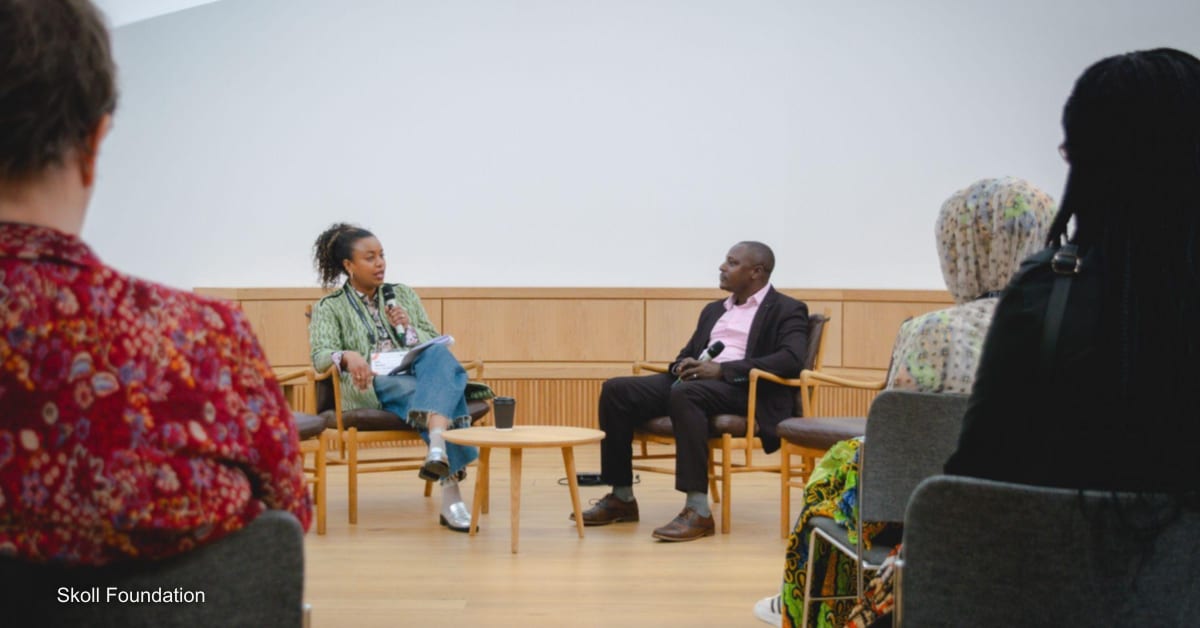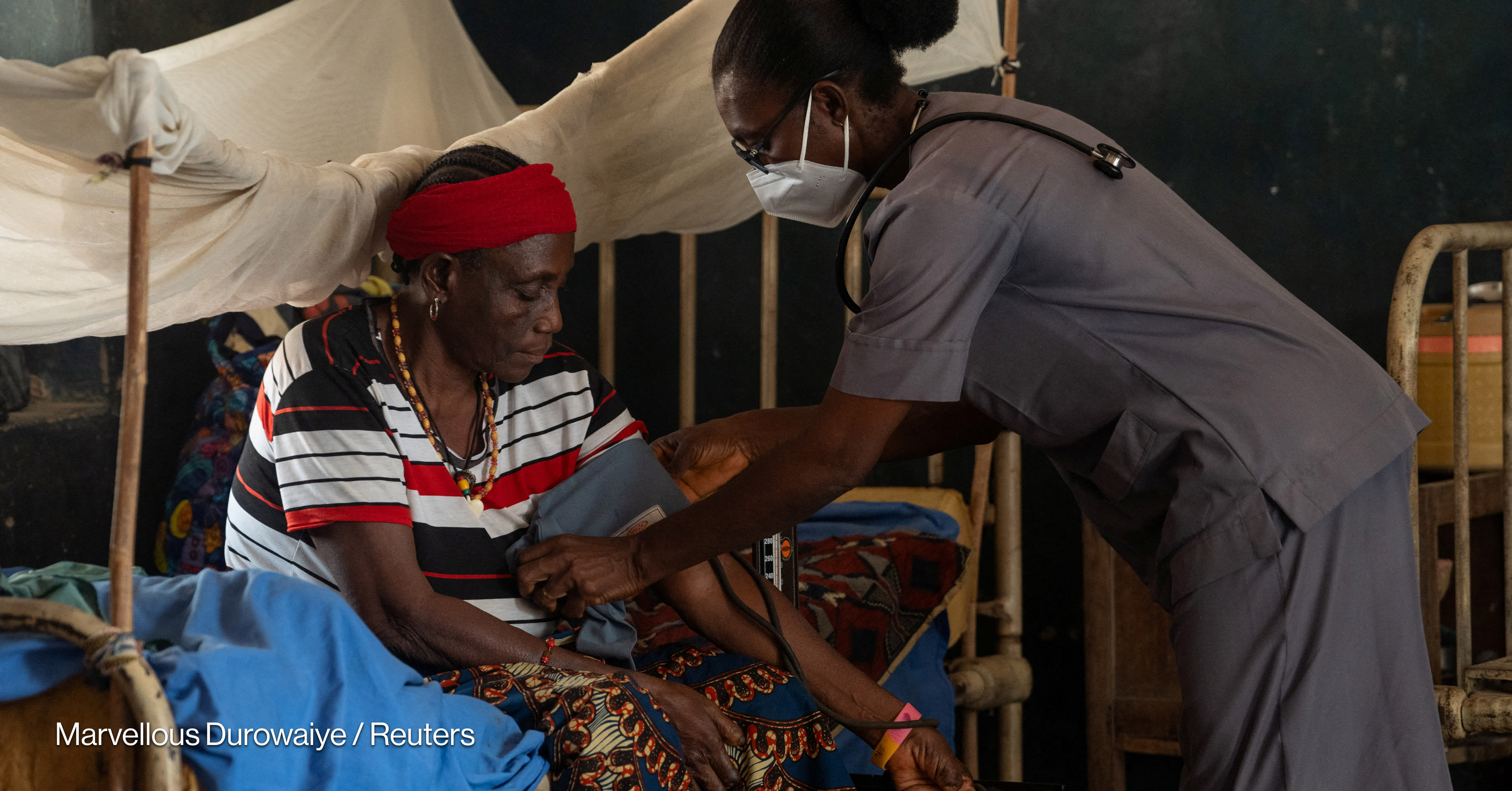InterAction chief: 'Our challenge as civil society is the need to mature the sector'
As CEO and president of InterAction, Sam Worthington has a unique perspective on the role of civil society in an evolving global development ecosystem. Devex talks to him to learn more about InterAction's work as well as what he calls the "globalization and localization of U.S. NGOs."
Civil society and nongovernment organizations represent a wide range of interests and support a diverse set of causes, making it difficult for these groups to organize into a community and coalesce around specific policies and issues. Despite this challenge, civil society and NGO leaders have recognized the power and potential of joining together to learn from one another, improve policies and programs and move the international development sector forward. For the past eight years, Sam Worthington has served as CEO and president of InterAction, the largest network of civil society organizations in international development and humanitarian assistance. In that role, Worthington, a former CEO of Plan International USA, has sought to unite diverse civil society organizations — from small NGOs to household names like CARE, Save the Children, and Habitat for Humanity. This work has afforded him a unique vantage point at the forefront of U.S. civil society’s engagement within an evolving global development ecosystem. Devex sat down with Worthington to discuss InterAction’s strategy and work, the evolution of civil society’s role in international development, and the “globalization and localization of U.S. NGOs.” InterAction is the largest organization of private voluntary members, representing over 180 NGOs working on international development, sustainability and humanitarian assistance issues. What challenges does InterAction face in representing such a diverse constituency and organizing its members around common issues? Given the incredible diversity of InterAction’s membership, we recognize that it would be difficult to achieve consensus among 190 organizations, so we encourage individuals with technical expertise in a given area to convene and form recommendations on specific issues with a subset of other members. Because InterAction has been around for so long, our members trust us to take leadership positions on higher-level issues that could move external actors, recognizing that not all members will agree with that position. This gives us the space and trust to articulate commonly supported positions that don’t necessarily have unanimous endorsement from our membership. That is by definition politically tricky, and we have to be careful to ensure our positions are based on our principles and serve the interests of the entire NGO sector. Can you give an example of how you might work to promote partnerships or coalitions among your member organizations? On the policy front, one example would be our efforts to influence the G-8 when the U.S. held its presidency. In engaging with the White House and U.S. Agency for International Development, It became clear that if we could align our members to support a common issue, we could significantly influence the process. We began to coalesce around the idea of pushing the G-8 to reduce stunting for 50 million children. Initially, our member organizations were focused on different angles of the issue, and we had to make the case that we had to push a single policy position to get traction. We targeted our media engagement and member advocacy around a single message, and ultimately the U.S. G-8 “sherpa” Mike Froman and President [Barack] Obama persuaded their counterparts to adopt nutrition as the primary development theme for the G-8. When the G-8 moved to London, we then asked if we could mobilize resources for the nutrition agenda. It became clear that no nation-state would take the first step, so we went back to our members to negotiate a pledge. The eventual pledge was $750 million of NGO resources over five years, with the actual anticipated spending exceeding $1 billion. That spurred a response by the U.K. government and the Children’s Investment Fund Foundation to launch a donors’ conference that eventually pledged $4.1 billion to advance the G-8 agenda. Our members have learned that if there is an opportunity to significantly influence a global agenda, they get far better results if they organize themselves around a common principle that resonates with external actors. Once we find that focus, we can have considerable success and impact. In a May 2015 blog post, you wrote that: "As the world changes, civil society organizations must evolve their methods in addressing emerging local and global issues." How do you think civil society organizations must evolve to be more effective? Our challenge as civil society is the need to mature the sector. By that I mean to evolve beyond saying as an outsider, “This is our position; you must meet it,” and placing demands on governments and institutions. If we stay at that level, the positions tend to be principled and right, but they get dismissed by policymakers and other actors making difficult choices. Our challenge is to have parts of civil society as outside advocates and other parts working more closely with policymakers, offering them potential solutions to trade-offs that push the thinking of decision-makers. This requires an evolution of approaches within civil society. A similar evolution also needs to happen in discussions with the private sector, moving away from the traditional image of civil society critiquing global capitalism to asking: “How do we influence value chains, how do we partner in shaping individual corporate engagement?” We’ve repeatedly articulated that you can’t base all your advocacy around largely left-leaning, and idealistic, but at times impractical, political positions. NGOs will be more effective if they adopt a broader-based, more sophisticated approach. Looking back over the last five to 10 years of evolution in development practice, what is the most critical area that has improved? What is the most critical area where we could do better? One area where there’s been a significant positive shift is the relationship between U.S. NGOs and the private sector. We are now in partnership mode, looking at how we can leverage each other, and NGOs have a much greater understanding of what can be accomplished through market-based mechanisms to advance a development agenda. The other area is the globalization and localization of U.S. NGOs. On one level, they’ve become multinational civic institutions. On another level, they have gone explicitly local. So the idea of a U.S. NGO with a 1,000-plus staff in a country office with no expatriates is no longer unheard of. The idea here is to tap local capacity and to ensure that the in-country presence of an NGO brand like Care is very much of that country, even though as an institution it is explicitly globalized. One area where we could improve has been the overall ability of the sector to leverage the U.S. government. I think it was Al Gore who said that 40 percent of U.S. foreign assistance should be leveraged through private voluntary organizations. I’m less interested in the specific percentage than the degree to which the U.S. government leverages the $18 billion of non-U.S. government resources managed by InterAction members. Are we approaching each other as co-equals, leveraging each other’s programs? The answer is no. The U.S. government has moved toward directly funding organizations it can as a contractor. In many ways, U.S. NGOs have moved away from government partnerships toward other resources, and the government has moved more directly toward partnerships with local groups and the private sector. Both of those moves make sense on their own, but what we’ve lost is the mutual leveraging of the NGO and government sectors. We understand you became CEO of Plan USA at a young age? What was that like? I’ve had an interesting career where in a relatively short period between the ages of 34 and 35, I went from directing a program to becoming CEO. Some of that was being at the right place at the right time, some of that was pure terror of, “Oh my goodness what have I gotten myself into?” and some of that was older individuals betting on a younger person and their potential. I think individuals no matter what their age can take on these jobs. In my case, I always assumed I’d always be behind the scenes, but then I found myself thrust into an opportunity which I grabbed. And now, some 20 years later, I’ve found that it was a tremendous opportunity to leverage positive change in the world in a way that I could never have imagined. Check out more insights and analysis for global development leaders like you, and sign up as an Executive Member to receive the information you need for your organization to thrive.
Civil society and nongovernment organizations represent a wide range of interests and support a diverse set of causes, making it difficult for these groups to organize into a community and coalesce around specific policies and issues. Despite this challenge, civil society and NGO leaders have recognized the power and potential of joining together to learn from one another, improve policies and programs and move the international development sector forward.
For the past eight years, Sam Worthington has served as CEO and president of InterAction, the largest network of civil society organizations in international development and humanitarian assistance. In that role, Worthington, a former CEO of Plan International USA, has sought to unite diverse civil society organizations — from small NGOs to household names like CARE, Save the Children, and Habitat for Humanity. This work has afforded him a unique vantage point at the forefront of U.S. civil society’s engagement within an evolving global development ecosystem.
Devex sat down with Worthington to discuss InterAction’s strategy and work, the evolution of civil society’s role in international development, and the “globalization and localization of U.S. NGOs.”
This story is forDevex Promembers
Unlock this story now with a 15-day free trial of Devex Pro.
With a Devex Pro subscription you'll get access to deeper analysis and exclusive insights from our reporters and analysts.
Start my free trialRequest a group subscription Printing articles to share with others is a breach of our terms and conditions and copyright policy. Please use the sharing options on the left side of the article. Devex Pro members may share up to 10 articles per month using the Pro share tool ( ).
Katherine Tan is an international development professional, specializing in private sector development. She has worked in the public sector, private sector, and NGOs and most recently as a Bankers without Borders fellow at the Grameen Foundation in Washington, D.C., She writes on topics pertaining to development innovation and social enterprise.
Cynthia Kao specializes in development issues in Asia and has been an active analyst in the field for the past five years. Experienced in conducting professional research projects for both private and nonprofit organizations in the Unites States and Taiwan, she has used her skills to craft in-depth research products covering development issues such as economic growth and education. She holds a master's degree in international development from the Josef Korbel School of International Studies and currently writes on sustainable development topics.








